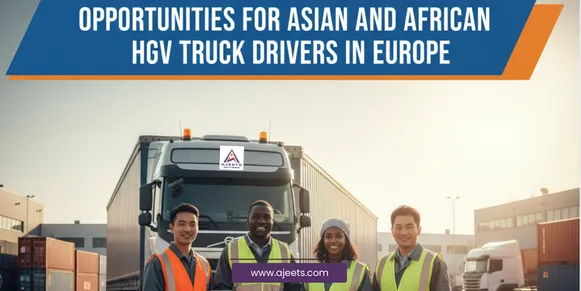The European logistics and transportation industry is currently experiencing one of the most significant workforce shortages in decades. With increasing trade volumes, rapid e-commerce growth, and an ageing driver population, the demand for qualified Heavy Goods Vehicle (HGV) drivers has reached a critical level.
As a result, logistics operators across Europe are increasingly turning to skilled professionals from Asian and African countries to fill this gap. For experienced drivers from nations such as India, Nepal, Bangladesh, Kenya, Ghana, and Nigeria, this presents an exceptional opportunity to secure stable, well-paying employment in Europe’s expanding logistics sector.
1. Rising Demand for Professional Drivers in Europe
The European Union’s road freight market continues to expand, but many countries are struggling to find enough qualified drivers. Reports suggest a shortage exceeding 400,000 HGV drivers across the continent, particularly in Poland, Romania, Germany, Hungary, and Lithuania.
The causes are multi-faceted — an ageing workforce, fewer young Europeans choosing the profession, and growing logistics needs. To ensure supply chains remain uninterrupted, employers are opening their recruitment channels to international candidates.
This labour demand has created new employment pathways for professional drivers from Asia and Africa who possess the required skills, discipline, and commitment to quality service.
2. Essential Requirements for HGV Drivers Seeking Jobs in Europe
Securing employment as a truck driver in Europe involves meeting specific technical and legal requirements. While each country may have unique regulations, the following are standard prerequisites across the EU:
- -Valid Driving Licence: Drivers must hold a Category C or CE licence, which allows the operation of heavy trucks and articulated vehicles.
- -Driver CPC (Certificate of Professional Competence): A mandatory certification across the EU, the CPC ensures professional competence and road safety compliance. Non-EU drivers may need to complete or convert this certification upon arrival.
- -Experience: Most employers prefer candidates with 2–5 years of verifiable experience in long-haul or heavy-duty transport.
- -Documentation: A valid passport, police clearance, medical certificate, and previous employment records are essential for visa and work permit processing.
Meeting these criteria increases employability and makes the transition to European standards smoother.
3. Visa and Work Permit Options
Non-EU citizens are required to obtain the appropriate work authorization before taking up employment in Europe. Several European countries have introduced streamlined visa programs to attract foreign HGV drivers.
Common visa and permit options include:
- -National Work Permits: Countries such as Poland, Romania, Hungary, Lithuania, Latvia, and Croatia actively recruit professional drivers through their national work permit systems.
- -Temporary or Seasonal Work Visas: Suitable for short-term logistics assignments or event-based transport operations.
- -Employer-Sponsored Work Visa: Many European logistics companies directly sponsor experienced drivers, handling documentation and visa processing through authorized recruitment partners.
Employers often collaborate with international manpower agencies to manage the end-to-end hiring process, ensuring compliance and legal deployment.
4. European Countries Hiring Asian and African HGV Drivers
Due to regional shortages, several countries are at the forefront of international driver recruitment:
- -Poland: A leading destination for foreign HGV drivers, offering legal work permits and attractive salaries.
- -Romania & Hungary: Rapidly growing logistics sectors, frequently hiring drivers from South Asia and Africa.
- -Lithuania & Latvia: Home to large European logistics operators offering cross-border routes and EU-wide operations.
- -Germany & The Netherlands: High-paying destinations with advanced transport infrastructure, though they require additional documentation and sometimes basic language proficiency.
These countries provide structured entry routes for non-EU professionals, offering long-term employment opportunities and career growth in logistics and transport.
5. Salary Expectations and Working Conditions
HGV driver salaries in Europe vary by region, experience, and the type of routes covered.
- -Eastern Europe: €900 – €1,800 per month
- -Western Europe: €2,000 – €3,500 per month
In addition to salary, most employers provide:
- -Overtime pay or trip-based incentives
- -Accommodation or housing assistance
- -Medical insurance and paid leave
- -Training on European safety and compliance standards
For drivers from Asia and Africa, these positions often provide significant income growth, improved living standards, and exposure to international logistics operations.
6. Finding Genuine Recruitment Opportunities
To ensure a safe and transparent recruitment process, it is crucial for candidates to work only with licensed and authorized recruitment agencies.
Key precautions include:
- -Verify that the agency is government-approved or recognized in your home country.
- -Avoid unverified intermediaries demanding large upfront fees.
- -Request a written employment contract outlining salary, accommodation, and working conditions before proceeding with any visa or payment.
- -Check the employer’s online presence or company registration to confirm authenticity.
Reputable recruitment agencies with international partnerships play a vital role in bridging skilled professionals from Asia and Africa with European employers.
7. Building a Long-Term Career in Europe
Beyond short-term employment, Europe offers long-term potential for professional drivers. With consistent performance and compliance, many drivers can extend their contracts, apply for residence permits, and pursue permanent settlement options depending on the host country’s regulations.
European transport companies value reliability, safety awareness, and communication skills — qualities that Asian and African drivers often demonstrate strongly. By maintaining professionalism and adhering to European transport standards, drivers can build sustainable careers and secure a prosperous future.
Conclusion
The shortage of HGV drivers in Europe has created a gateway of opportunity for experienced professionals from Asia and Africa. With the right qualifications, legal documentation, and guidance from certified recruitment partners, thousands of drivers are already working successfully across European logistics networks.
